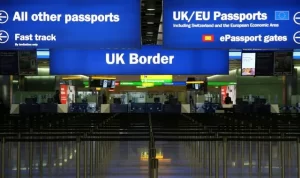
The UK government, under the leadership of the Labour Party, has made significant strides in its efforts to reduce illegal immigration. Since assuming power in July, the Home Office has intensified its efforts to remove individuals who have no legal right to remain in the country. However, this progress is juxtaposed against the persistent challenge of rising Channel crossings. Points
- Record-Breaking Removals: The government has claimed that more migrants have been removed from the UK in the first six months of Labour’s term than in any other equivalent period since 2019.
- Channel Crossings Surge: Despite increased efforts to deter illegal immigration, the number of migrants arriving via small boats across the English Channel continues to rise, reaching record levels.
- Government’s Strategy: The Home Office has outlined a multifaceted approach to address the issue, including:
- International Cooperation: Strengthening partnerships with countries like France, Italy, and Albania to disrupt smuggling networks.
- Enhanced Border Security: Deploying advanced technology and increasing the number of immigration enforcement officers.
- Targeted Enforcement: Cracking down on illegal working and exploitation to reduce the pull factors for migrants.
- Public Awareness Campaigns: Disrupting the people-smuggling business model by debunking false narratives about opportunities in the UK.
Challenges and Controversies
While the government’s efforts are commendable, several challenges persist:
- Capacity Constraints: The asylum system remains overwhelmed, leading to processing delays and backlogs.
- Legal Hurdles: Human rights considerations and legal challenges can hinder the removal process, particularly for vulnerable individuals.
- Public Opinion: The issue of immigration remains deeply divisive, with public opinion often swayed by sensationalized media coverage and political rhetoric.
The UK government’s commitment to reducing illegal immigration is evident, but the complex nature of the problem requires a comprehensive and long-term solution. Balancing the need for effective border control with humanitarian concerns will be a delicate task for policymakers in the years to come.

